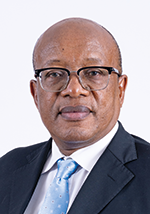
Mid-November saw the release of the latest KPMG 2022 CEO Outlook, South African edition, aptly sub-titled ‘Potential Growth in Uncertain Times’. This annual report, which is globally driven, draws on the perspectives of 1325 CEOs across 11 markets to provide insight into their three-year outlook on the business and economic landscapes – including South Africa.
The latest edition, which examined the global pandemic, inflationary pressures and geopolitical tensions, still speaks to some positive outcomes, with local CEOs stating that they are already mitigating any anticipated recession risks by focusing on technology, talent and ESG (environmental, social and governance) initiatives to shape their progress over the next three years.
In fact, the KPMG CEO Outlook Survey revealed that
The biggest challenge in delivering on ESG strategies over the next three years will be identifying and measuring agreed metrics.
The KPMG CEO Outlook Survey noted that, while CEOs recognise the importance of ESG initiatives globally as demand for more robust ESG reporting and transparency grows amongst investors and customers, ESG has still fallen down the boardroom agenda as a top operational priority for nearly 70% of global executives (58% in 2021).
However, 10% of local CEOs have also stated that stakeholder scepticism around greenwashing is their top challenge in communicating ESG performance to stakeholders (compared to 17% globally and up 11% since 2021) and more than one-third of CEOs say ESG performance reporting within their organisation doesn’t have the rigour of financial reporting.
According to Ignatius Sehoole, CEO at KPMG SA, “When examining the challenges in delivering ESG strategies, we have seen that local CEOs list ‘identifying and measuring agreed metrics’ as the biggest challenge, compared to ‘pressing business/economic matters redirecting focus from ESG’ for global CEOs.
“The importance of ESG initiatives on businesses, especially with regards to improving financial performance, driving growth and meeting stakeholder expectations, cannot be stressed enough. While we know there is a lack of an accepted global framework for measuring and disclosing ESG performance, the KPMG survey revealed that 65% of stakeholders (institutional investors and employees) are demanding greater ESG transparency and reporting, and 60% of CEOs noted that 10% of their revenue would be allocated to invest in programmes to enable organisations to be more sustainable.
“However, what is encouraging to see is that confidence in the resilience of the global economy over the next six months is optimistic, with 64% of local CEOs – compared to the 73% of global executives – indicating they are still cautiously focused on future opportunities during the current uncertainty.”
Business Leadership South Africa (BLSA) CEO, Busisiwe Mavuso, added to this sentiment, stating, “there is a myriad of new investment opportunities available in South Africa, such as renewable energy generation and the transmission sector, and of course, the electric vehicle manufacturing sector and the generation of green hydrogen is seeing increased interest and growth locally.”


Changes in headcount over the next three years
The KPMG CEO Outlook Survey has also pointed to the fact that the employee value proposition in attracting and retaining necessary talent is one of the top operational priorities for achieving organisations’ three-year growth objectives. In fact, 70% of CEOs indicated that they are expected to increase their headcount over the period by a maximum of 10%, with most CEOs focusing on talent and technology in preparation for forecasted recession.
Some questions remain regarding the rush to ‘return to normal’, given that nearly half of global CEOs say remote or hybrid work has had a positive impact on collaboration and innovation. However, 76% of local CEOs still envision workers working in the office full-time within the next three years (compared to 65% globally), and 24% have stated that hybrid – with no fully remote workers – is expected. Based on these outcomes, local CEOs prefer their workforce back in the office full-time.
Evolving focus toward reputational and technology risks
CEOs are keeping technology risk front of mind in the short and long terms. In fact, disruptive technology has emerged as the top risk and greatest threat to organisational growth over the next three years, with four times as many CEOs than KPMG’s CEO Outlook Pulse Survey earlier this year (12% in August 2022 versus 3% in January and February 2022) citing this as a priority.
However, locally, supply chain risk is now highlighted as the top risk, which is a change from 2021 when cybersecurity was identified as the top risk. Even so, 82% of the local CEOs have noted that they are prepared for cyberattacks, compared to 56% globally.
Furthermore, the survey revealed that current uncertainty is driving CEOs to continue to prioritise corporate digital transformation, with 84% stating that they have an aggressive digital investment strategy designed to help them secure a first-mover or fast-follower status (compared to 72% globally). However, despite a clear willingness and reasoning to advance digitalisation, 72% of businesses highlighted the need to address burnout from accelerated digital transformation over the past two years.
“When it comes to digitalisation and the Fourth Industrial Revolution (4IR), most of South Africa’s counterparts are well ahead of us. However, it is encouraging to note that 84% of local CEOs are investing in aggressive digital investment strategies. Innovation and new technologies not only have the potential to create employment, but also increase economic growth, especially during these uncertain times,” adds Mavuso.
M&A; appetite is expected to improve despite economic concerns
The KPMG CEO Outlook Survey also revealed that while mergers and acquisitions (M&A) appetite was moderate, 44% of local CEOs still see significant improvement to global averages noted earlier this year (with 23% saying they had high appetite) and therefore some increase is expected in the coming years.
“Certainly, it is important to note that the single most pressing concern for local executives is economic factors such as rising interest rates, inflation and anticipated recession. Therefore, while the International Monetary Fund (IMF) expects Africa’s most developed economy to see an economic growth rate of 2,1% for 2022, down from July’s forecast of 2,3%, South Africa’s economy is still expected to slow down significantly to 1,1% from 1,4% in 2023,” says Sehoole.
“However, what is encouraging is the confidence in the resilience of the global economy from global leaders over the next six months, with 73% stating they believe there is buoyancy. I am also very hopeful due to the fact that progress on diversity and inclusion has moved up in relevance in the business sector, with 68% of global respondents indicating that this is important to them.”
Mavuso further concludes that, as several organisations focus on digitisalation, there are possible challenges in some workers suffering from burnout, and others being displaced due to automation. “Organisations need to focus on wellness programmes that will support their talent acquisition, but reskill employees who are likely to be displaced by these new technologies. Any CEO or leader will tell you that employees are an organisation’s greatest asset, and attracting and retaining necessary talent is rightly one of the top operational priorities to achieving any growth objective.”
Key findings of the KPMG 2022 CEO Outlook Survey
• The anticipated recession will disrupt growth; however, CEOs are mitigating risks by focusing on technology, talent, Environment, Social, and Governance (ESG) to shape progress over the next three years.
• 72% of local executives have already taken steps to boost productivity in preparation for the anticipated recession.
• The biggest challenge facing local CEOs in delivering their ESG strategy over the next three years is identifying and measuring agreed metrics.
• However, confidence in the resiliency of the global economy over the next six months is optimistic – with 64% of local executives, compared to 73% of global executives – indicating CEOs are cautiously focused on future opportunities during uncertainty.

© Technews Publishing (Pty) Ltd. | All Rights Reserved.